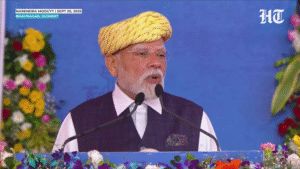Advertisements
India says there will be “humanitarian consequences” from the new US price for H-1B visas.
According to the Indian government, there will be “humanitarian consequences” if a new cost of $100,000 (£74,000) is imposed on applicants for US skilled worker visas.
The higher H-1B visa application price, which is more than 60 times the current fee, was ordered by President Donald Trump on Friday to take effect on September 21.
Advertisements
With little over 70% of all visas granted, Indian workers are by far the most skilled in the program.
According to reports, some US IT companies instructed their H-1B visa holders to remain in the US or, if they were abroad, to attempt to return right away. The White House then made it clear on Saturday that the fee would not be charged for applications for renewals or existing visas.
The cost would have humanitarian repercussions “by way of the disruption caused for families,” according to a statement released on Saturday by the Indian Ministry of External Affairs.
Additionally, the Indian government stated that it “hopes that these disruptions can be addressed suitably by the US authorities.”
The statement added that the skilled worker exchange has “contributed enormously” to both countries and that “Policy makers will therefore assess recent steps taking into account mutual benefits, which include strong people-to-people ties between the two countries.”
The message didn’t go into detail about how the Indian government would react.
The two nations have been engaged in contentious trade talks ever since Trump put hefty tariffs on India last month for buying Russian energy. According to the US Trade Representative’s office, the US imported more than twice as much, $87.3 billion, in 2024 as it exported, $41.5 billion, to India.
According to Reuters, the Indian government announced on Saturday that Piyush Goyal, its minister of commerce, would travel to the United States on Monday to discuss trade.
India’s top trade association, Nasscom, stated that making such a significant alteration to the H-1B program during such a short period of time had caused “considerable uncertainty for businesses, professionals, and students across the world.”

The White House claimed that the visas were not being used as intended when it announced the proposed change, citing statistics that indicated certain visas were being “abused” to outsource IT work and undercut American pay.
However, the White House stated that “case-by-case exemptions if in the national interest” are permitted under the directive.
Trump raises the skilled worker visa application fee by $100,000.
The goal of the skilled visa route is to enable US businesses to hire foreign workers with “highly specialized knowledge” on a temporary basis.
According to the US-based Pew Research Center, just under 400,000 H-1B visas were granted in 2024, with about 260,000 of those being renewals.
According to data from the US Citizenship and Immigration Services (USCIS), Amazon approved 10,044 H-1B visas in the first half of 2025, the most of any company.
Tata Consultancy Services (TCS), an Indian IT giant, came in second with 5,505.
According to Trump’s proclamation, applications for employees who are currently working outside of the US must be “accompanied or supplemented by a payment of $100,000” (roughly 8.8 million Indian Rupees). Currently, an application costs $1,500 in administrative expenses.
According to Reuters, Amazon, Microsoft, and JP Morgan were among the companies that advised their H-1B visa holders to stay in the United States and those who were not to try to return before the deadline.
Since the directive made no mention of H-1B visa holders being prohibited from returning to the country or subject to the additional fee if they were temporarily abroad after Sunday, the advisory seemed to be preventative.
Employees who are unable to return to the US before the decision takes effect should refrain from seeking US re-entry “until further guidance is provided,” according to an internal memo seen by Business Insider.
Advertisements